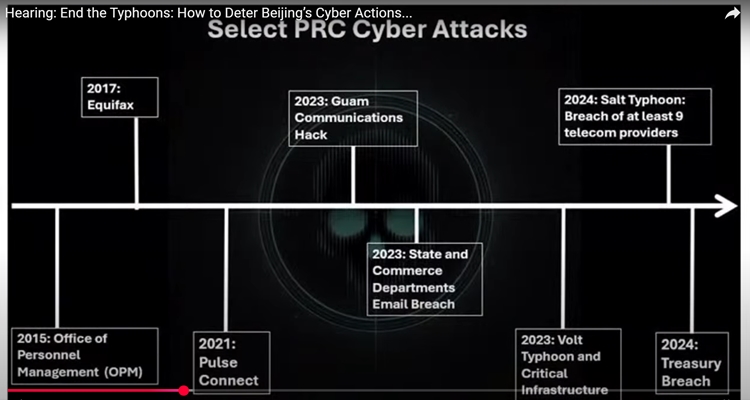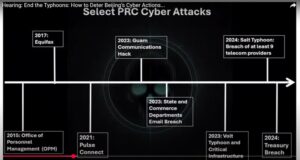
U.S. Consulting Firm McKinsey “Equipped America’s Foremost Adversary” and Lied About It Under Oath
On October 18, 2024, the Select Committee reported on its investigation of McKinsey.
Select Committee Chairman John Moolenaar and U.S. Senators Marco Rubio and Joni Ernst revealed “how McKinsey failed to disclose consulting work for the Chinese government and appeared to misrepresent the firm’s work for the Chinese government under oath, all while receiving over $480 million to consult for the U.S. military since 2008. In nearly 17 pages, the lawmakers outline the details of McKinsey’s work to advance the Chinese Communist Party and Chinese military, its work to shape the Chinese Communist Party’s five-year plans to surpass the United States, and its failure to report its China work as required by U.S. law.”
Legislation to Revoke China’s Permanent Normal Trade Relations
On January 23, 2025, Congressmen John Moolenaar and Tom Suozzi introduced the Restoring Trade Fairness Act. Senators Tom Cotton and Jim Banks introduced companion legislation in the House.
Suozzi: “This bipartisan bill makes the message clear—the Chinese Communist Party cannot receive preferential tariff treatment. The Chinese Communist Party is engaging in unfair trade practices that devastate the American manufacturing industry’s ability to compete, contribute to the theft of American intellectual property, and allow goods made with forced Uyghur labor in Xinjiang to enter our supply chain.”
The bill has not yet emerged from committee.
Deterring China’s Cyber Attacks and Bolstering “America’s Lackluster Cyber Defenses”
On March 5, 2025, the Select Committee held a hearing (video here; transcript here) on how to “End the Typhoons,” i.e., deter and better defend against China’s catastrophic cyberattacks on the United States, “hardly isolated incidents,” said Congressman Raja Krishnamoorthi in an opening statement. It’s time to “get the CCP out of our networks once and for all….
“Fourth, we need to hold the CCP accountable…. It means imposing costs on the CCP each time they attack us.”
Rob Joyce, former director of cybersecurity at the National Security Agency: “TP-Link routers were among the various brands exploited by Chinese
state-sponsored hackers in the massive Volt, Flax, and Salt Typhoon attacks…. We cannot have the software for prolific devices be written, updated, and controlled by a Chinese company. By law, such a company is subject to the direction of the PRC intelligence apparatus.
[Responding to a question about what may happen if the PRC attacks Taiwan, Joyce said:]
“You can imagine that the computers that plan and support the DOD, both in civilian infrastructure and in the government, are an important aspect to our success in being able to mount that defense. So the Chinese would look to disrupt those capabilities to move, organize, and get to the theater of conflict.
“The second thing they’d do, though, is they would want to cause the American people to be disrupted and concerned by cyber attacks against our critical infrastructure here in the U.S. so we would turn inward and have that societal panic where we wouldn’t be interested in a fight on the other side of the world. We’d be dealing with messes here.
“So they’re prepositioned in things like rail, transport, ports, air, our airlines, and others, the electric grid, the water supply, so that they could create that disruption here in the U.S. and cause us to not have the will to get into that fight.”
Letter to President of the University of Illinois Urbana-Champaign “on National Security Risks Posed by Chinese Nationals in STEM Programs”
This letter, dated March 19, 2025, is one of several listed on the Select Committee’s documents page addressed to presidents of American universities and discussing the same subject.
“The significant tuition revenue generated by international students—many of whom pay full tuition—has caused elite universities to become financially dependent on foreign enrollment, particularly from China. This reliance on foreign students, especially those from adversarial nations, raises serious concerns about the displacement of American talent, the outsourcing of expertise, and the long-term implication for U.S. technological leadership and economic security. The intelligence community has warned that American campuses are ‘soft targets’ for espionage and intellectual property theft.”
Passage of DETERRENT Act to reduce CCP influence on U.S. higher education
In a March 27, 2025 press release, Chairman Moolenaar is quoted as heralding “a critical stand against the Chinese Communist Party’s efforts to infiltrate and influence our academic institutions. The passage of the DETERRENT Act is a powerful response to China’s aggressive attempts to use financial leverage to undermine our universities and national security. This legislation enhances transparency, closes dangerous loopholes, and holds institutions accountable for their dealings with foreign adversaries like the CCP. By strengthening oversight, we are ensuring American higher education remains focused on its mission of academic integrity, not serving the interests of hostile foreign powers.”
The release states that a recent investigation “found nearly $40 million in unreported research contracts between top U.S. universities and Chinese entities tied to the CCP and its military. This alarming discovery made clear what many have long suspected: foreign adversaries are using American colleges and universities to gain access to sensitive research, spread propaganda, and undermine our national security.”
Upcoming: “Financial Aggression: How the Chinese Communist Party Exploits American Retirees and Undermines National Security”
This hearing will be held by the Select Committee and the Senate Special Committee on Aging on April 9, 2025.
The focus will be “the urgent need for Americans to safeguard their retirement savings against the volatile and predatory actions of the CCP. Witnesses will discuss the unique challenges, risks, and scams created by the CCP’s system, emphasizing how Communist China’s growing influence jeopardizes the financial stability of hardworking Americans, and their retirement funds.”












